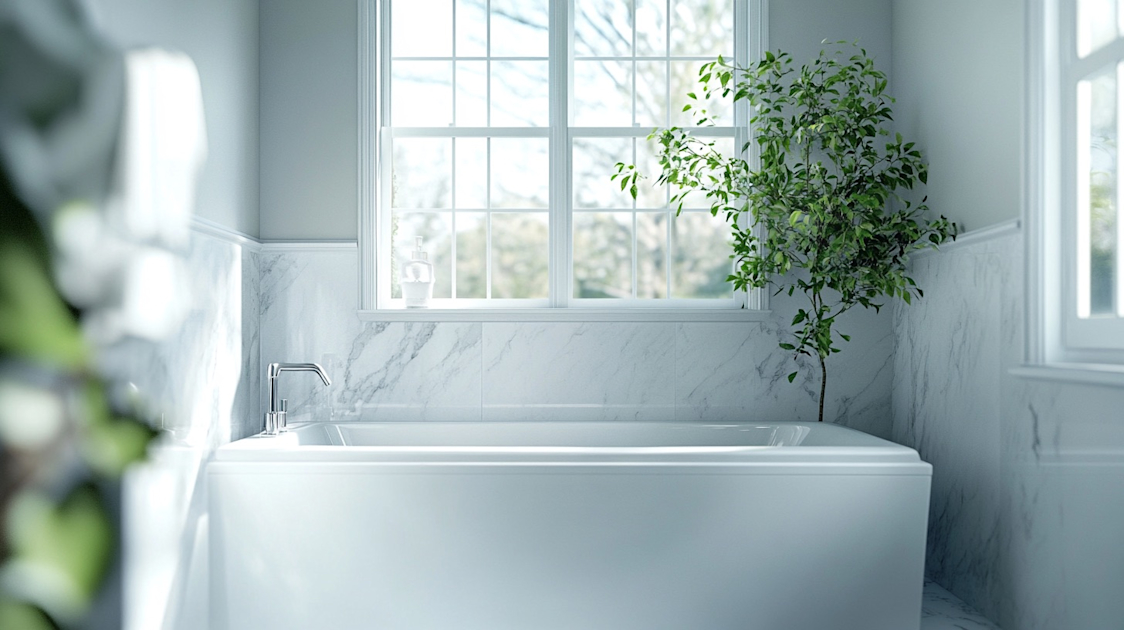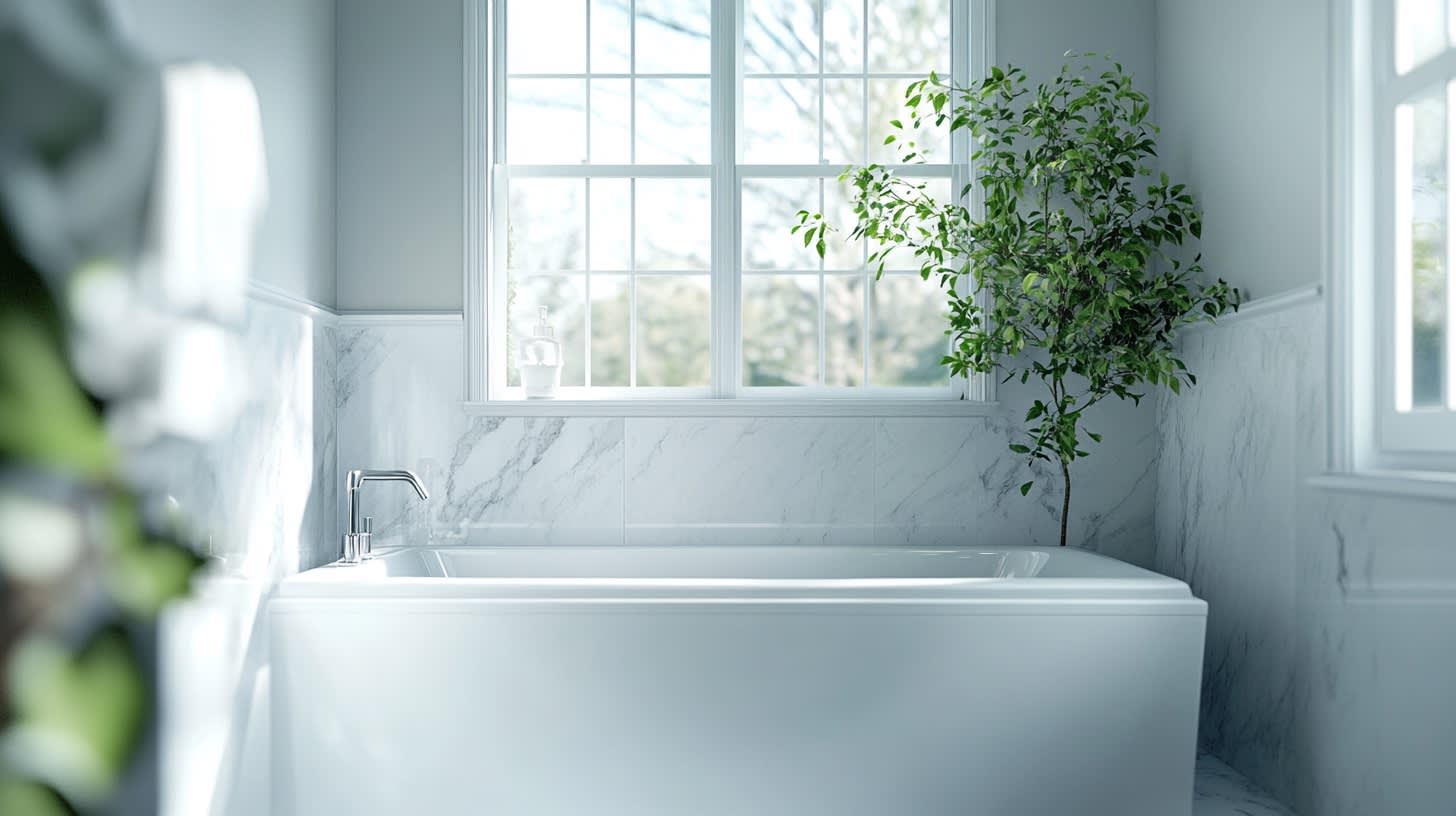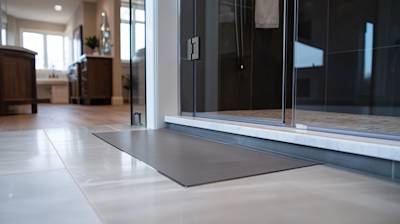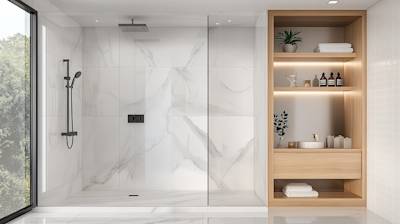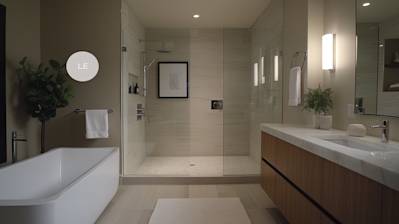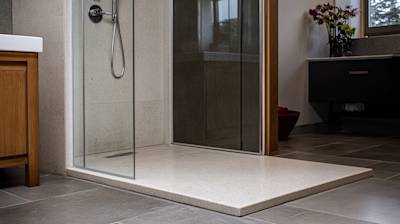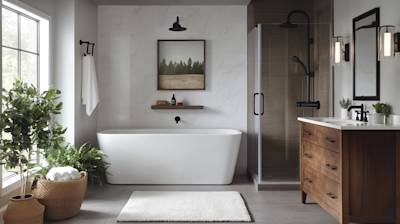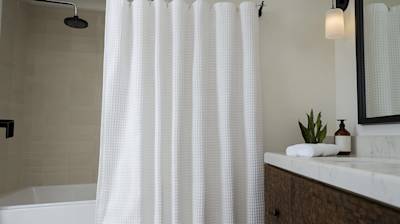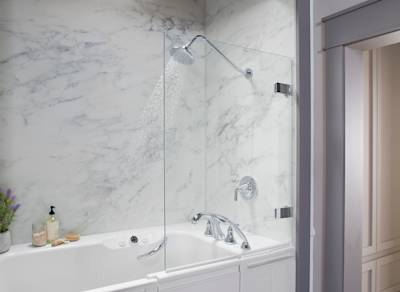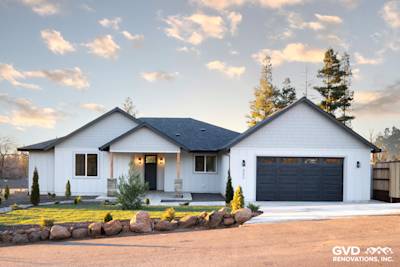Are you dreaming of transforming your shower into a relaxing bathtub or a functional bath-shower combo? Whether you crave for an evening soak with a good book or lounging in the bubbles after a long day at work, a Shower to Bathtub Conversion could be the answer. This guide walks you through the key steps and considerations in this conversion process.
Unraveling the Shower to Bathtub Conversion Process
A shower to bathtub conversion might seem a daunting task. But with a sound strategy and a good understanding of the process, this remodeling project can be smooth. Let’s get to know the basics first.
Assessing The Space
Your existing bathroom layout and space significantly influence the bathtub options available for you:
- Single Shower Stall: Suitable for smaller bathtubs, and possibly, some standard-size models.
- Double Shower Stall: Offers room for a larger bathtub or even a whirlpool tub.
Layout and Plumbing Considerations
In a shower to bathtub conversion, the placement of your current drain and water supply points is crucial. Relocation can add significant costs and time to your project.
Deciding the Type of Bathtub
Your personal preference, the available space, and your budget together decide which type of bathtub will be suitable:
- Alcove tubs
- Freestanding tubs
- Soaking tubs
- Whirlpool tubs
- Walk-in tubs
The Conversion Process
In simplified terms, the shower to bathtub conversion process involves the following tasks:
- Removal of the old shower and fixtures
- Adjusting or installation of new plumbing
- Installing the new bathtub
- Installation of new fixtures and shower-tub combo, if you opt for it
- Finishing and sealing
Key Cost Factors in Shower to Bathtub Conversion
To confidently plan this bathroom remodeling project, it’s essential to know what can impact your budget. Here are the key cost factors:
- Bathtub Selection: The type, material, and brand of the bathtub will essentially determine much of your project cost.
- Plumbing Changes: Existing plumbing might need adjustment or replacement. Add in potential costs if you need to relocate the drain or supply lines.
- Labor Costs: Labor can be one-third to one-half of the overall cost, depending on your location and the complexity of the project.
- Additional Features: Any extras like advanced faucets, custom walls, or built-in features can add to your final bill.
Pro Tips for a Successful Shower To Bathtub Conversion
Through careful planning and smart choices, you can ensure a smooth and successful shower to bathtub conversion. Here are some pro tips to assist you:
- Measure Accurately: Ensure you have accurate measurements of your space. Remember to account for doors or windows that might limit the size of the tub.
- Check your water heater capacity: Larger bathtubs may require more hot water than your current system can provide. You might need to upgrade your water heater.
- Consider future buyers: If you're planning to sell your house someday, consider average buyer preferences. Bath-shower combos are generally more appealing.
- Contractor selection: Choose experienced and reputable contractors. Check their past projects, reviews, and references.
- Understand what’s included in the quote: Make sure your contractor’s quote includes both material and labor costs to avoid any unexpected expenses.
Frequently Asked Questions about Shower To Bathtub Conversion
What professionals are needed for a shower to bathtub conversion?
Shower to bathtub conversions usually require a team of professionals that include a plumber, a tile installer, and potentially a glass installer if you have a shower door. It may be possible to find a bathroom remodeler who can manage all these roles.
Is converting my shower to a bathtub a time-consuming process?
The timeframe for a shower to bathtub conversion varies based on the intricacies of your specific project and the professionals you're working with. Generally, it takes anywhere from a couple of days to a week. This includes time for demolition of your existing shower, installation of the new bathtub, and final touches like tiling and plumbing.
How much space do I need for a shower to bathtub conversion?
Bathtubs will generally require more space than shower stalls, and the amount of space you have will dictate the size of bathtub you can install. Standard tubs are usually 60 inches long and 30 or 32 inches wide, but options are available for smaller or larger sizes, depending on the space available.
Will a shower to bathtub conversion affect my property value?
Yes, changing a shower into a bathtub can affect your property value. Exactly how much depends on your locality and the existing bathroom configuration. If most homes in your area have at least one bathtub, then conversion could positively impact your home’s resale value.
What styles of bathtubs can I consider for my shower to bathtub conversion?
There are numerous styles of bathtubs you can choose from for your shower to bathtub conversion. Options include, but aren't limited to, freestanding tubs, alcove tubs (where the tub is surrounded by three walls), corner bathtubs, and soaking tubs for those who love a deep bath.
Can a shower to bathtub conversion save water?
Shower to bathtub conversions might not necessarily save water. A bath in a standard-sized tub uses around 36 gallons of water, while a 10-minute shower with a low-flow showerhead only uses 25 gallons. So unless your showers are very long, they probably use less water.
Can I convert my shower back to a bathtub if I decide I don't like it?
Yes, you can convert back to a shower if you decide a bathtub isn't right for you, but it will require another round of renovation. It’s always important to consider your needs and use before engaging in a shower to bathtub conversion.
Can I DIY a shower to bathtub conversion?
While some people certainly have the skills to DIY a shower to bathtub conversion, it's not generally recommended. There are complex aspects to consider, such as ensuring the new bath is correctly sealed and the plumbing is correctly installed to avoid leaks or water damages, which are costly to repair.
What material should I consider for my new bathtub?
Bathtub materials can vary from acrylic and fiberglass to cast iron and stone resin. The right choice depends on your budget, style preference, and the amount of maintenance you are willing to commit to. For example, acrylic tubs are budget-friendly and easy to maintain, while cast-iron tubs are more durable and retain heat well, but are heavier and more expensive.
Pros of Shower to Bathtub Conversion
Improved Relaxation
One of the primary advantages of converting a shower to a bathtub is the opportunity for enhanced relaxation. A shower is functional and terrific for an efficient, quick clean, but there is simply no substitute for the soothing, calming experience of a long, hot bath. Bathtubs can provide a private sanctuary for decompressing after a long day, unwinding with a good book, or even enjoying a glass of wine.
Versatility and Functionality
Bathtubs are incredibly versatile, functioning as both a space for a quick rinse or a long soak. This versatility can be particularly beneficial in households with children, as bathtubs are often easier and safer for bathing young ones than showers. Plus, many pets prefer baths to showers, so a bathtub conversion might make pet grooming at home easier.
Increased Home Value
Converting a shower to a bathtub can increase the overall value of your home, particularly if the home currently doesn't have a bathtub. Families with young children or individuals who prefer a relaxing bath often see bathtubs as a must-have feature, which can make your home more marketable should you ever decide to sell.
Aesthetic Appeal
Bathtubs, particularly freestanding or clawfoot models, can add a significant aesthetic appeal to your bathroom. With a variety of designs available, a bathtub can become the centerpiece of the bathroom, providing a luxurious, spa-like feeling.
Cons of Shower to Bathtub Conversion
Cost
Converting a shower to a bathtub can be somewhat expensive, depending on the type of tub you choose, the need for plumbing modifications, and labor costs. Budget should certainly be factored in when considering a shower to bathtub conversion.
Space Requirements
Bathtubs require more space than showers. If you have a small bathroom, the installation of a bathtub may make the space feel cramped or unbalanced. In smaller bathrooms, a shower might be more practical and suitable for the space.
Safety Concerns
Bathtubs can present safety issues, particularly for older adults or anyone with mobility issues. Climbing over the side of a bathtub can be difficult and hazardous, leading to slips and falls. For these individuals, a walk-in shower with grab bars may be a safer option.
Increased Water Usage
A bathtub requires significantly more water than a shower, which can lead to higher water bills and increased environmental impact. If water conservation is a concern, sticking with a shower might be the better option.
Time and Effort
Converting a shower into a bathtub also requires a significant amount of time and effort. The conversion process can disrupt your daily routine, as the bathroom will be out of use during the conversion period. If you have only one bathroom in the home, this inconvenience could be a significant drawback.
In Conclusion
A shower-to-bathtub conversion can offer many benefits, like improved relaxation, versatility, increased home value, and more aesthetic appeal. However, it's important to consider the potential cons like cost, space requirements, safety concerns, increased water usage, and the time and effort involved in conversion. Weighing these pros and cons can help you decide if a bathtub conversion is right for your home.
Summary
So there you have it. Shower to bathtub conversion can be a smooth process if you carefully consider your space, budget, and needs. It can greatly enhance your bathroom aesthetics, offering a comfortable, relaxing bathing experience. Just like that, you can transform your quick shower routine into a soothing soak in the tub, making your time in the bathroom more enjoyable.
This transformation process of shower to bathtub conversion does need some professional assistance to ensure good quality work. Also, it's crucial to choose the right design and materials for your new bathtub. This way, you will not only enjoy a beautiful, functional tub but also increase the value of your home. At the end of the day, the comfort and luxury of your own time in the tub is totally worth it.
With the affordable and efficient options available today, getting a shower to bathtub conversion is worth considering. Instead of thinking about this as a tiresome renovation process, consider it an investment in your comfort and the overall appeal of your bathroom. After all, there’s nothing quite like immersing oneself in a tub after a long day. Make the switch, you won't regret it!
About GVD Renovations & Remodeling
GVD Renovations & Remodeling is a locally-owned and operated home remodeling company based in Roseville, CA. We take pride in delivering pristine craftsmanship, value-driven solutions, unmatched customer satisfaction, and many years of hands-on industry experience. Our talented team is passionate about creating beautiful spaces that you can enjoy for years to come. Whether we're updating your kitchen, crafting a luxurious bathroom, or installing energy-efficient windows, you can trust us to elevate your living experience. After all, your home deserves the best, and that's the GVD promise!
Tags: Shower, Bathtub, Conversion,



